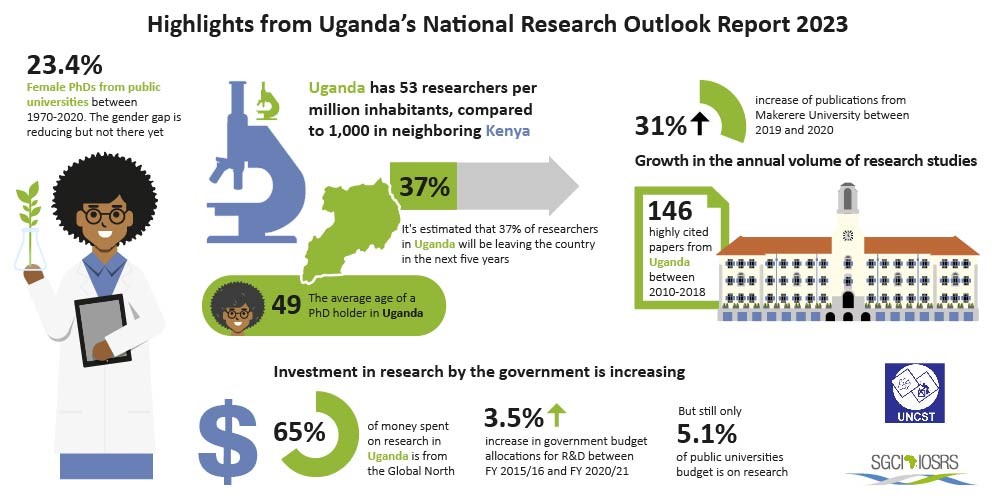Uganda’s National Research Outlook Report 2023 shows that Science, technology and innovation are set to play a vital role in the country’s socioeconomic development. The report, compiled by Uganda National…
Uganda’s National Research Outlook Report 2023 shows that Science, technology and innovation are set to play a vital role in the country’s socioeconomic development. The report, compiled by Uganda National Council for Science and Technology (UNCST), helps to identify system gaps in Uganda’s science and technology capacity. Addressing these gaps will help Uganda build resilience to new and emerging challenges. In this blog, we take a look at the report.
UNCST is playing a pivotal role in the present and future of science in Uganda. It furnishes the Government of Uganda with evidence for scientific policy formulation. The report provides valuable data for this formulation. It serves as a knowledge resource for assessing the current state of Uganda’s scientific capacity. The country’s progress towards establishing a knowledge-based economy relies on solid science. Emphasizing the need for policy reforms in specific areas can bring about real change.

When it comes to science, what challenges and opportunities does Uganda face?
Uganda’s research visibility has improved, but challenges persist. Insufficient investment in data impedes the broader science, technology and innovation system. And Uganda has lower research outputs compared to neighbouring countries. Although Uganda has progressed in research and development, it still lags in global research indicators. Nevertheless, there has been growth in the volume of research. The number of research studies carried out annually has increased six-fold over the past ten years.
Research performance remains a crucial factor for academic advancement. However, the report highlights barriers that hinder researchers from reaching their full potential. This includes gender disparities. Of all PhDs, only 23.4% are female. The gender gap is closing but more needs to be done. Policy reforms are crucial for enhancing research productivity and outcomes.
Several critical enablers must be expedited. This includes obvious ones, such as research funding and science training. Only 5.1% of public university budgets is spent on research. It also includes enablers such as gender inclusivity and fostering wider research collaborations.
Private sector use of research results is another crucial issue that Uganda will need to address. Fast-tracking these enablers is crucial. In so doing, Uganda can move toward achieving its targets for science-led development.
When harnessed, these efforts can contribute significantly to Uganda’s socioeconomic transformation. They can harness the opportunities presented by ongoing technological advancements. Effectively, they can position the country and help it to navigate the challenges of the modern world.
Critical messages around Uganda’s science goals
The report highlights 12 key messages concerning Uganda’s science goals. By way of overview, these messages show that the country’s research ecosystem is expanding. But they also highlight how more can be done. Ugandan universities are placing a growing emphasis on international research collaboration. Furthermore, government investment in research and development has been increasing. However, the investment has not kept pace with global trends. And efforts are now underway to rationalize public research spending.
Work in science aims to foster connections between public and private research entities. The promotion of interdisciplinary research is essential for cost-effectiveness. And there has been a notable shift in the sources of public research funding. Collaborations with industry are increasing, for example, and education policies have evolved. They now incorporate a more comprehensive range of skills necessary for innovation.
Uganda is actively developing a new “culture” of science and innovation. It’s doing this through an initiative of eight science value chains. This initiative aims to promote public participation in science. It also seeks to foster scientific entrepreneurship.
The government is also playing a crucial role in driving research and supporting emerging technologies. It’s aligned its efforts with broader missions. These include addressing unemployment and eradicating poverty. They include a range of objectives from enhancing household resilience to strengthening value chains.
What are Uganda’s prospects going forward?
Overall, Uganda’s research system is demonstrating growth. It’s becoming more adaptable and resilient. This underpins its inherent capabilities and latent potential. In Uganda, strengthening research is recognized as a prerequisite for achieving development goals.
Looking to the future, Uganda must leverage opportunities to strengthen its position. It must develop its scientific base to prevent the loss of its research talent, which is on the move. Almost one-third of researchers have indicated intentions to move abroad in the next five years.
Reinforcing funding sources is essential since 65% of the money spent on research comes from the Global North. Most studies are done in collaboration with researchers from this vast region. And this means they can sometimes have greater influence on how the research is conducted and disseminated. Funding science internally could help strengthen Uganda’s voice in its research projects.
The report was launched in June 2023 when the Science Granting Councils Initiative hosted its annual regional meeting in Kampala.
According to the report, the government of Uganda has prioritized science in its transformative agenda. The 2023 National Research Outlook Report for Uganda provides a solid overview of Uganda’s research landscape. It examines research talent, funding and international collaboration. It considers Uganda’s position in the global research system. And it looks at the connection between research and commercialization. Most importantly, it identifies concrete challenges and opportunities. When leveraged, these opportunities can help the country address persistent development issues. A solid science policy can lead to lasting prosperity and sustainability.
Themes
The SGCI aims to strengthen the capacities of these SGCs to support research and evidence-based policies that will contribute to economic and social development.

